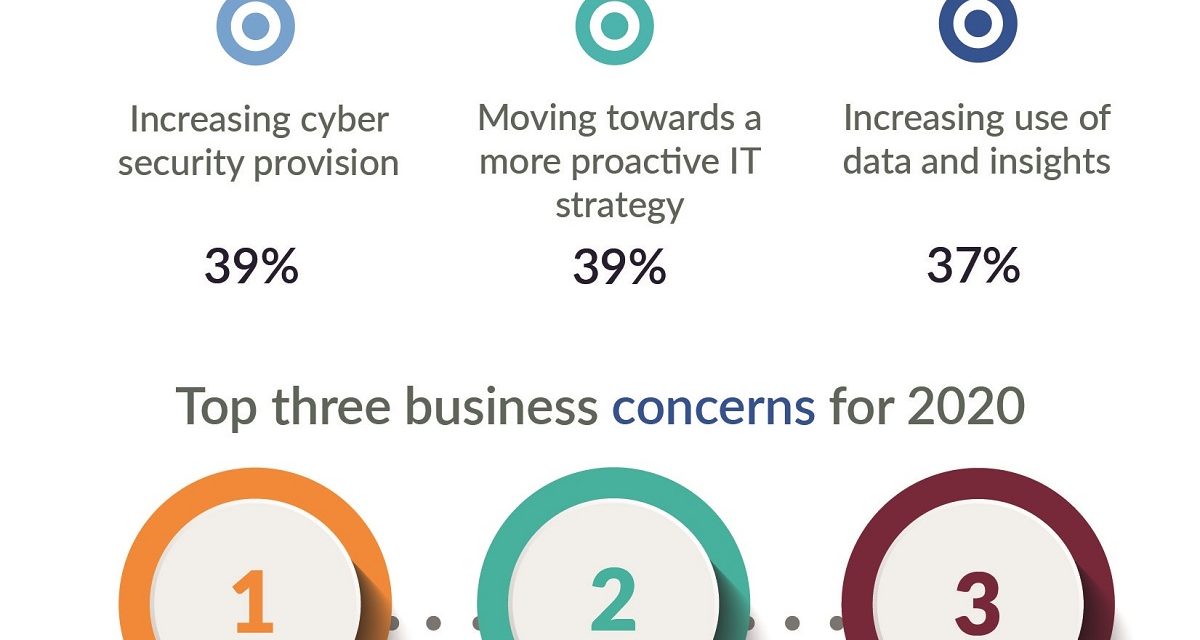IT services provider OGL Computer has revealed the top technology concerns and priorities for UK SMEs in its new report: The State of Technology at UK SMEs.
The report also highlights spend on IT and cyber security and reveals how 100% of SMEs based in the North East, North West and Yorkshire and Humber regions plan to increase spending in 2020, alongside SMEs in Greater London. This is compared to the lowest expenditure in Wales, where only 76% of SMEs planned to increase spend.
In the face of this rising awareness and increasing volume of threats, it comes as a welcome confirmation that action is indeed being taken by UK SMEs in response.
Across all sectors, SMEs with 100 – 249 employees are most likely to increase IT budgets in 2020. Healthcare, HR / recruitment and manufacturing sectors were most likely to increase spend, while their peers in the legal, finance, retail and leisure sectors were least likely to increase spend.
The report also highlights newer technologies such as robotics and AI that SMEs plan to adopt, how SMEs are using technology to power remote workforces and what technologies they are adopting for growth.
To develop the report OGL Computer surveyed technology decision makers in SMEs with 50-500 employees across a range of industries and conducted in-depth interviews with leaders in SMEs to identify their top priorities and concerns for 2020.
Paul Colwell, Technical Director, OGL Computer and its cyber division CyberGuard Technologies, comments: “The inaugural State of Technology at UK SMEs report reveals that IT decision-makers at SMEs have clear strategies for the future, and understand the opportunities and challenges that face their verticals in 2020.
“These range from the perennial, such as the ever-present threat of serious cyber-attack or data breach to effectively managing the increasing amount of data flowing through the organisation. In addition, moving to the cloud securely and an ongoing lack of technology-savvy workers emerged as key themes.
“Handling these challenges, all with a fraction of the resources of their larger, corporate counterparts requires flexibility and demonstrates the resilience that gives SMEs the power to succeed. As we head into a new decade where the only constant is likely to be change, it is heartening to learn through our survey that SMEs continue to adopt innovative products and services.”
Key Findings:
Technology priorities and concerns
The survey established the technology priorities and concerns SMEs are expecting in 2020:
- The top three key technology priorities: increasing cyber security provision 39%, moving towards a more proactive IT strategy 39%, and increasing use of data and insights 37%
- The main technology concerns for 2020 were cyber security attacks 67%, data management 56%, and a lack of technology-savvy workers 54%
- 57% of respondents said that increasing the use of cloud computing is planned, to drive business efficiencies and profitability
- 92% of SMEs are planning to spend more on cyber security and IT in 2020
Cyber security trends
Cyber security features heavily in the report with respondents revealing attack frequency, cyber strategy status and employee training to combat hackers.
- The vast majority of SMEs confirmed that they were increasingly worried, with 81% more fearful of a cyber-attack or data breach
- 81% of UK SMEs confirmed that they had suffered a data breach or cyber-attack
- Nearly 1 in 5 (17%) IT decision-makers surveyed have no cyber strategy in place
- 76% agree that they are nervous about moving from an on-premise IT infrastructure to a cloud infrastructure due to fears of data security
- 98% of IT decision-makers in SMEs educate employees about how to identify a cyber threat, with the most popular approach being a combination of external and internal training (32%)
- SMEs in the financial sector were more likely to suffer 3 or 4 breaches than any other sector at 50%, while healthcare and IT & Telecoms sectors were most likely to suffer 2 breaches at 75%.
Download the full report at www.ogl.co.uk/SOTreport2020


















